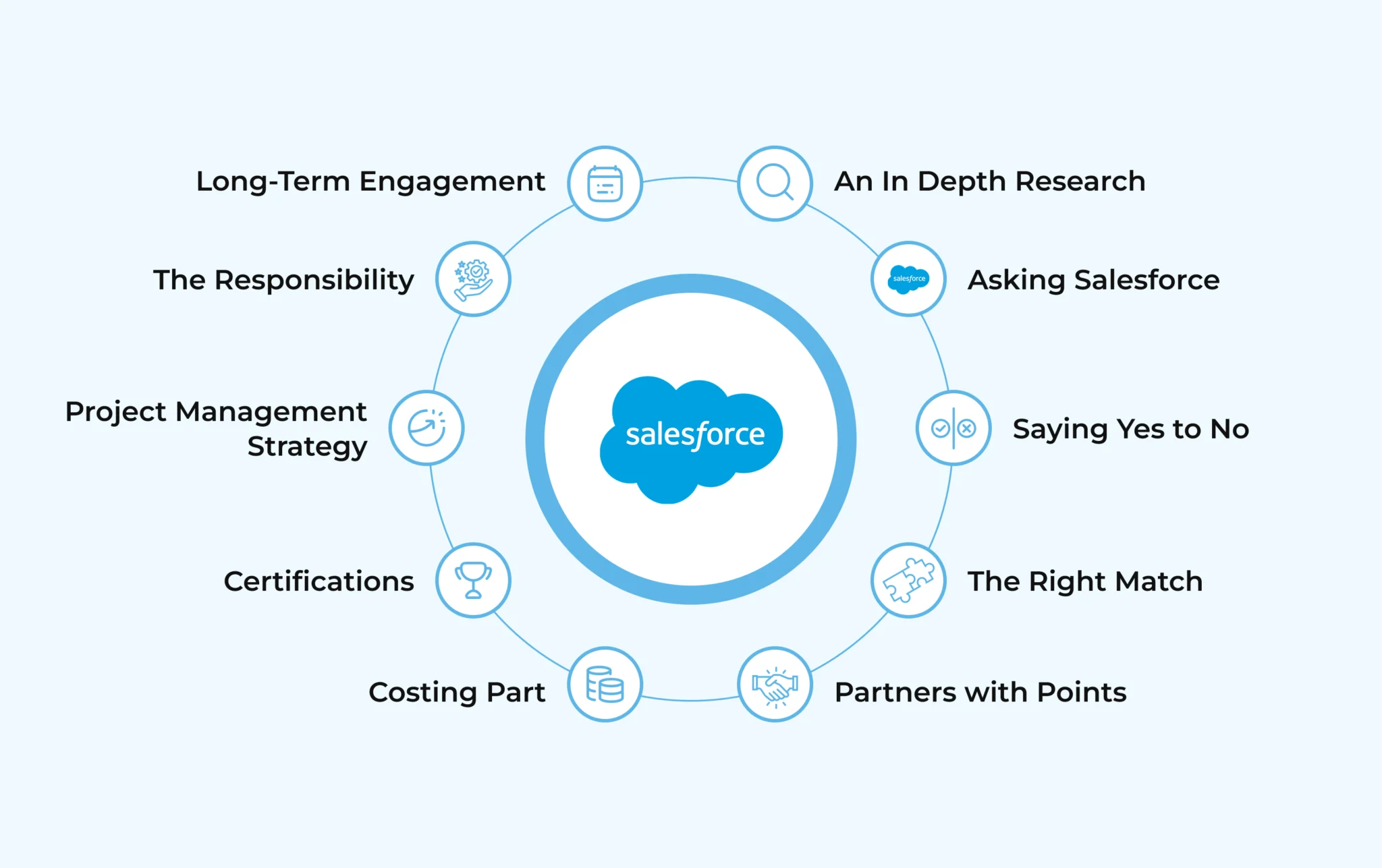Salesforce Consulting: Why You Need a Partner for Success

Embarking on a Salesforce implementation journey can feel daunting. The platform itself is incredibly powerful, a sophisticated CRM system designed to streamline sales, marketing, service, and more. However, its complexity can easily overwhelm internal teams. Without expert guidance, projects can quickly become bogged down by challenges, leading to delays, budget overruns, and ultimately, a suboptimal solution.
Imagine this: your company decides to renovate a kitchen. You have a vision for the ideal space – sleek countertops, high-end appliances, and a functional layout. However, without the expertise of a professional contractor, you might encounter unforeseen obstacles:
-
- Unrealistic timelines: You underestimate the time required for demolition, plumbing, and electrical work.
- Cost overruns: Unexpected issues arise, leading to budget blowouts and potentially compromising the quality of materials.
- Design flaws: Without proper planning, the kitchen may lack functionality or not meet your specific needs.
- Safety hazards: Improper installation can lead to safety issues and potential damage to your home.
A similar scenario can unfold during a Salesforce implementation. While the platform itself is a powerful tool, successful implementation requires a deep understanding of its intricacies, best practices, and the specific needs of your business. This is where Salesforce consultants play a crucial role.

Why Choose a Salesforce Consultant?
Just as you wouldn’t attempt a major kitchen renovation without a contractor, embarking on a Salesforce implementation without expert guidance can be risky. Here’s why partnering with a Salesforce consulting firm is essential:
-
Accelerated Implementation Timelines:
- Consultants possess in-depth knowledge of Salesforce and proven methodologies for rapid implementation.
- They can streamline the process, identify and mitigate potential roadblocks, and ensure projects stay on track.
- This translates to a faster time-to-value, allowing your team to start leveraging the benefits of Salesforce sooner.
-
Minimized Risks and Errors:
- Consultants have encountered and overcome numerous challenges during previous implementations.
- They can anticipate potential pitfalls, proactively address them, and minimize the risk of costly errors.
- This ensures a robust and stable Salesforce environment, reducing the likelihood of data loss, system downtime, and user frustration.
-
Expertise in Best Practices and Customization:
- Salesforce is highly customizable, offering a wide range of configurations and integrations.
- Consultants possess deep expertise in Salesforce best practices and can guide you towards optimal configurations that align with your specific business processes.
- They can help you leverage the platform’s full potential, maximizing its value and ensuring a solution that truly meets your unique needs.
-
Improved ROI through Optimized Configurations:
- Consultants can help you optimize your Salesforce implementation to achieve a higher return on your investment.
- By identifying areas for improvement and suggesting enhancements, they can help you streamline workflows, improve data quality, and increase user adoption.
- This can lead to significant improvements in sales productivity, customer satisfaction, and overall business performance.
-
Access to Specialized Skills and Knowledge:
- Salesforce implementations often require a diverse skillset, including development, integration, data migration, and change management.
- Consultants possess a wide range of specialized skills and knowledge, ensuring you have the right expertise available when needed.
- This eliminates the need for your internal team to develop in-depth expertise in all aspects of the Salesforce platform.
Choosing the Right Salesforce Partner:
Selecting the right Salesforce consulting partner is crucial for project success. Just as you wouldn’t choose a kitchen contractor based solely on price, you shouldn’t select a Salesforce partner without careful consideration. Here are some key factors to consider:
-
Proven Experience:
- Look for partners with a track record of successful Salesforce implementations, particularly within your industry.
- Inquire about their experience with similar projects, the size and complexity of those projects, and the outcomes achieved.
- Request case studies and client testimonials to gain insights into their past successes.
-
Relevant Certifications:
- Salesforce offers various certifications to its partners, demonstrating their expertise and commitment to the platform.
- Choose partners with relevant certifications, such as Salesforce Administrator, Salesforce Developer, and Salesforce Architect.
- These certifications provide assurance that your partner possesses the necessary skills and knowledge to deliver a successful implementation.
-
Client Reviews and Testimonials:
- Read client reviews and testimonials to gain insights into the partner’s approach, communication style, and the quality of their work.
- Look for consistent positive feedback from previous clients, highlighting their satisfaction with the project outcomes and the overall client experience.
- Consider reaching out to a few of their past clients to gather firsthand feedback on their experience.
-
Communication and Collaboration:
- Effective communication is paramount for a successful partnership.
- Choose a partner that aligns with your communication style and fosters a collaborative working relationship.
- Ensure that they are responsive, transparent, and proactive in their communication throughout the project lifecycle.
-
Methodology and Approach:
- Inquire about the partner’s methodology and approach to Salesforce implementations.
- Do they follow a structured approach, such as Agile or Waterfall?
- Understand their approach to data migration, testing, and user training.
- Ensure their methodology aligns with your project requirements and your preferred way of working.
-
Project Team and Expertise:
- Inquire about the composition of the project team.
- Will you have access to experienced project managers, developers, analysts, and other specialists?
- Ensure the team has the necessary skills and experience to address your specific project needs.
-
Project Management Tools and Technologies:
- Understand the project management tools and technologies used by the partner.
- Will they utilize project management software, such as Jira or Asana, to track progress and facilitate communication?
- Ensure that their tools and technologies are compatible with your internal systems and workflows.
-
Value Proposition and Pricing:
- While cost is an important factor, it should not be the sole determining factor.
- Evaluate the partner’s value proposition and pricing model.
- Consider their experience, expertise, and the overall value they bring to the table.
- Ensure the pricing is transparent and aligned with your budget constraints.
Decision-Making Framework:
-
Define Project Scope and Objectives:
- Clearly define the scope and objectives of your Salesforce implementation project.
- Identify your key business goals and how Salesforce will help you achieve them.
- Document your requirements, including desired functionalities, integrations, and user expectations.
-
Research and Shortlist Potential Partners:
- Conduct thorough research to identify potential Salesforce consulting partners that meet your initial criteria.
- Utilize online resources, industry directories, and referrals from trusted sources.
- Create a shortlist of 3-5 potential partners based on your initial evaluation.
-
Conduct Due Diligence:
- Conduct in-depth due diligence on each shortlisted partner.
- Request proposals, conduct interviews with key personnel, and conduct reference checks with previous clients.
- Evaluate their responses, assess their understanding of your needs, and compare their proposals.
-
Assess Methodology and Approach:
- Carefully evaluate each partner’s proposed methodology and approach.
- Determine if their approach aligns with your project requirements and your preferred way of working.
- Consider their experience with similar projects and their ability to adapt to your specific needs.
-
Choose the Right Partner:
- Based on your evaluation, select the partner that best meets your criteria.
- Consider factors such as experience, expertise, communication style, and overall value proposition.
- Choose a partner that you believe will be a true collaborator and a valuable asset to your project.
Conclusion:
Partnering with the right Salesforce consulting firm can significantly increase the likelihood of a successful implementation. By carefully considering the factors outlined above and following a structured decision-making process, you can select a partner that will help you achieve your business objectives and maximize your return on investment.
Remember: A successful Salesforce implementation is not just about technology; it’s about people, processes, and change management. Choose a partner that understands your business needs, embraces a collaborative approach, and is committed to your long-term success.
- Find a Salesforce Consulting Partner: Begin your search today and explore the many qualified partners available in the Salesforce ecosystem. Utilize online resources, industry directories, and referrals from trusted sources to identify potential partners.
- Contact Us: Schedule a consultation to discuss your Salesforce needs and learn how we can help you achieve your business goals. Our team of experienced Salesforce consultants can provide expert guidance and support throughout your entire implementation journey.
By taking the time to select the right Salesforce consulting partner, you can ensure a smooth, successful implementation that delivers tangible business value.
